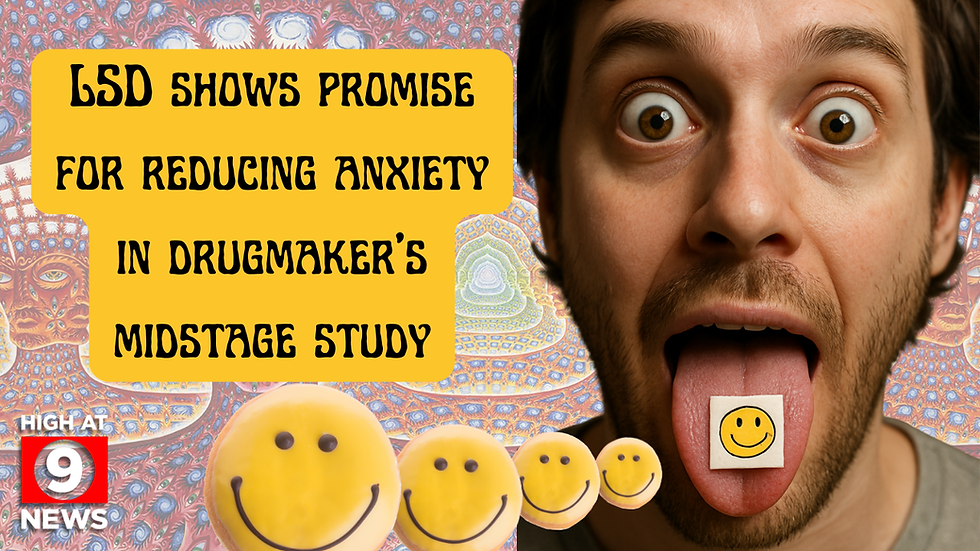LSD shows promise for reducing anxiety in drugmaker's midstage study
- barneyelias0
- Sep 5, 2025
- 2 min read
OG Article By Matthew Perrone Watch Today's LIVE Episode on X and Rumble
and Youtube
September 05 2025

A midstage study of the psychedelic drug LSD showed positive results for easing symptoms in people with generalized anxiety disorder
Study Overview
A midstage study published in the Journal of the American Medical Association found that LSD, a psychedelic drug banned in the U.S.
for over 50 years, reduced anxiety symptoms in patients with generalized anxiety disorder. Conducted by drugmaker Mindmed, the study tested various LSD doses, with benefits lasting up to three months. The company plans further trials to confirm results and seek FDA approval.
Psychedelic Research Revival
Psychedelics are experiencing a resurgence in scientific and public interest, with studies exploring their potential for conditions like depression, anxiety, and PTSD.
The FDA has labeled LSD, psilocybin, and MDMA as potential “breakthrough” therapies based on early findings. However, challenges remain—last year, the FDA rejected MDMA for PTSD due to flawed study methods and potential bias.
Study Design and Results
The LSD study involved nearly 200 patients who received one of four LSD doses or a placebo. Unlike other psychedelic trials combining drugs with extensive therapy, patients received a single supervised LSD dose without therapy and were monitored for three months.
At four weeks, those on the two highest doses showed significantly lower anxiety scores. After 12 weeks, 65% of patients on the 100-microgram dose saw continued benefits, with nearly 50% in remission. Common side effects included hallucinations, nausea, and headaches.
Placebo patients also improved, but their gains were less than half those of the LSD group. However, many patients guessed whether they received LSD or placebo, weakening the study’s “blinded” design. Some patients also dropped out early, reducing the final data set.
Future Steps and Challenges
Mindmed is conducting larger, late-stage trials to track longer-term effects and seek FDA approval. Dr. Maurizio Fava, the study’s lead author and a Mindmed adviser, noted that some patients may need retreatment, though the frequency is unclear.
The study’s simplicity—avoiding extensive therapy—addresses some FDA concerns but raises questions about how patients process intense psychedelic experiences without follow-up support.
Historical Context and Policy Interest
LSD’s therapeutic potential was studied extensively in the 1950s and 1960s for conditions like alcohol addiction and depression. Research halted after a 1970 law classified LSD as a Schedule 1 drug, linked to counterculture figures like Timothy Leary.
Mindmed’s study marks a bold step in revisiting LSD’s medical use, unlike earlier efforts focusing on less controversial psychedelics like psilocybin.
Health Secretary Robert F. Kennedy Jr. and Trump administration officials have shown interest in fast-tracking psychedelic therapies for veterans and others with mental health issues. Generalized anxiety disorder affects about 3% of U.S. adults, per the National Institutes of Health, with current treatments including psychotherapy and antidepressants.
Conclusion
Mindmed’s study offers promising evidence for LSD as an anxiety treatment, but further research is needed to address study limitations and confirm long-term benefits. The revival of psychedelic research signals a shift toward exploring new mental health treatment options.














Comments